Osu thétstexwes thel á:yelesóx… here means ‘So (she) told my mother…’ (literally: ‘told my late ancestor’). The ‘she‘ is just understood from context.
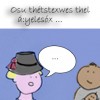

Osu thétstexwes thel á:yelesóx… here means ‘So (she) told my mother…’ (literally: ‘told my late ancestor’). The ‘she‘ is just understood from context.
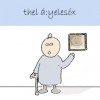
Thel á:yelesóx means ‘my late relative’. Literally it means ‘one who has left me’, or ‘one who has departed me’. This is a common way to refer to deceased family members, and here Elizabeth uses it to refer to her late mother.

A:yel means ‘to leave, to go away, to depart‘. To talk about leaving a specific person, you use a related word: á:yeles – ‘to leave (him/her, etc.)’
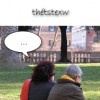
Thétstexw means ‘to tell’ .
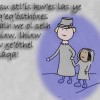
Osu stl’ís kw’es las ye sq’eq’ósthóxes yalh we ol selh lhíxw ew x̲ e’óthel máqa means ‘(She) wanted to accompany me [i.e. take me on a trip], even though I was just three or four years old.
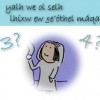
Yalh we ol selh lhíxw ew x̲ máqa means ‘I was just three or four years old’‘. (Note that Elizabeth repeats the lhíxw twice, literally ‘I was just three—three years old‘. This phrase has many words that do not translate directly into English.)
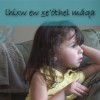
Lhíxw ew x̲e’óthel máqa means ‘three or four years old‘. Literally it means ‘three or four snows’.
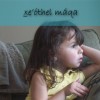
X̲e’óthel máqa means ‘four years old’‘. Literally it means ‘four snows’.
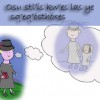
Osu stl’ís kw’es las ye sq’eq’ósthóxes means ‘(She) wanted to accompany me’.
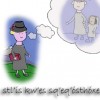
Stl’ís kw’es sq’eq’ósthóxes means ‘(She) wanted to accompany me’. Less literally, you could also translate it as ‘She wanted to take me on a trip’.
